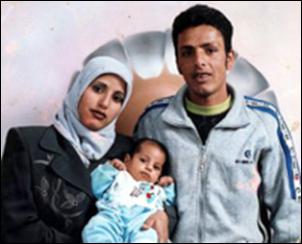B’Tslem Appeals Closing Of Firas Qasqas Investigation
B’Tslem Appeals Closing Of Investigation Into Death Of Firas Qasqas
21 May 2012
On 15 May 2012, on behalf of B’Tselem, Attorney Gabi Lasky, filed an appeal to the State Attorney against the decision by the Central District Attorney’s office to close the investigation into the fatal shooting of Firas Qasqas by reserve-duty soldiers on 2 December 2007. The appeal was submitted after an examination of the material from the investigation into this case revealed that there is concrete evidence that necessitates an indictment for the negligent shooting of Qasqas, and that the decision to close the case is patently unreasonable and should be reversed.

The State Attorney’s office told B’Tselem of its decision to close the case in January 2012, more than four years after the incident, and only after Attorney Gabi Lasky had submitted B’Tselem’s appeal to the High Court of Justice demanding that the MAG Corps make a decision about whether to take steps against those involved in this incident. Some four months elapsed between the announcement that the case would be closed and B’Tselem’s receipt from the State Attorney’s office of all the investigative material in the file required to appeal the decision.
As grounds for closing the case, the Central District Attorney’s Office cited the absence of a sufficient evidentiary foundation for a conviction. It claimed that although the shooting did not conform to the open-fire regulations, this “was a unique operational situation, in which the soldiers … felt that they were in real danger.” The Attorney’s Office concluded that, “even if the order to shoot was mistaken, it does not amount to negligence.” The announcement also stated that “there is a significant absence of evidence with respect to the ability to prove a causal connection between the firing and the alleged death of Firas Qasqas.”

Click for big version.
The area where Qasas and his brothers-in-law were taking a walk when he was shot to death. Photo: B'Tselem
In the appeal, Atty. Lasky rejected these claims and countered that the conclusion of the Central District Attorney’s office that there is no case for negligence cannot be accepted. Firing live ammunition at people without prior warning, at a distance that does not permit accurate shooting, without defining a clear objective and without taking even minimal care to fire precisely – is all in contravention of the open fire regulations, and occurred in a situation in which there was no real danger to the soldiers. As such, such actions are beyond the bounds of professional error. At a very minimum, such firing constitutes negligent behavior, and even in such a case obliges conducting criminal proceedings. Lasky also argued that there is a clear causal relationship between the shooting and the death of Qasqas and that the decision to close the case is patently unreasonable, inimical to the rule of law and to the public interest in potecting civilians, and sends a dangerous message of disregard for human life.
The decision by the State Attorney’s office to close the case was made after it told the court in August 2011, in the framework of B’Tselem’s appeal, that based on its examination of the investigatory material in the file on the killing of Firas Qasqas, it had decided to bring charges against the officer responsible for the killing, pending a hearing for the officer in November 2011. The State Attorney’s office did not reveal what charges were being brought against him. After the hearing, the State Attorney’s office changed its mind and decided to close the case.
Background
Firas Qasqas, age 32, was killed on 2 December 2007 by soldiers’ gunfire near the A-Tira area of Ramallah. Qasqas, a resident of the village of Batir in the Bethlehem district, had gone with his family to visit relatives at their home in A-Tira. B’Tselem’s information indicates that around midday, Qasqas was walking with his two brothers-in-law in an open area near some houses in the neighborhood. The three noticed a group of soldiers about 500 meters away, as the crow flies. Qasqas’ two brothers-in-law told B’Tselem that the soldiers fired live ammunition toward the three men, without prior warning, and despite the fact that the three were unarmed and did nothing to endanger the soldiers. Qasqas was wounded by a bullet that penetrated his back and exited from his abdomen. His brothers-in-law took him to a hospital in Ramallah where he died of his wounds.
Following the incident, B'Tselem wrote to the Judge Advocate General’s Office on several occasions, demanding that the Military Police Investigation Unit (MPIU) open an investigation into the circumstances of the killing. Some two months later – which was about a year after the incident -- an investigation was opened. B'Tselem assisted the MPIU in coordinating the taking of testimonies of the two men who were with Qasqas when he was shot, and provided the MPIU with all the relevant material the organization had in the matter.
To the best of B’Tselem’s knowledge, the investigation of the case ended in April 2009, and on 25 July 2009 the file on the investigation was transferred for examination by the MAG Corps for operational matters. B’Tselem made repeated inquiries demanding a decision in the case, without effect, until in February 2011 B’Tselem submitted a petition to the HCJ through Attorney Gabi Lasky. The MAG Corps then transferred the case to the State Attorney’s office, arguing that military law no longer applies to those involved in the incident, since they were reserve soldiers and due to the length of time that elapsed since the incident. The State Attorney’s office notified the Court that it had only received the file on 7 March 2011, and was given a two-month extension by the Court in order to examine the investigatory material. The State Attorney’s office subsequently received two further extensions for supplementary investigation, at its request. In August 2011, the State Attorney’s office announced that after examining the investigatory material in the file on the killing of Firas Qasqas, a decision had been made to try the officer responsible for his killing, pending a hearing to be conducted for the officer during November. In mid-January 2012 the State informed the Court that following the hearing given the officer, no indictment would be filed against him and the case would be closed.
ENDS


 UN News: Indian Ocean Tsunami Anniversary - A Call To Safeguard Future Generations
UN News: Indian Ocean Tsunami Anniversary - A Call To Safeguard Future Generations Milad Haghani & Arthur Stukas, The Conversation: 50 years ago, Cyclone Tracy flattened Darwin – and Australia’s attitude to disasters changed forever
Milad Haghani & Arthur Stukas, The Conversation: 50 years ago, Cyclone Tracy flattened Darwin – and Australia’s attitude to disasters changed forever UN News: General Assembly Approves $3.72 Billion UN Budget For 2025
UN News: General Assembly Approves $3.72 Billion UN Budget For 2025  Brenna R. Hassett, Human Bridges: The Controversy Over Cannibalism
Brenna R. Hassett, Human Bridges: The Controversy Over Cannibalism Save The Children: One Week On From Devastating Earthquake, Families In Vanuatu Still Terrified
Save The Children: One Week On From Devastating Earthquake, Families In Vanuatu Still Terrified UN News: Over 207 Executed In Port-Au-Prince Massacre - UN Report
UN News: Over 207 Executed In Port-Au-Prince Massacre - UN Report